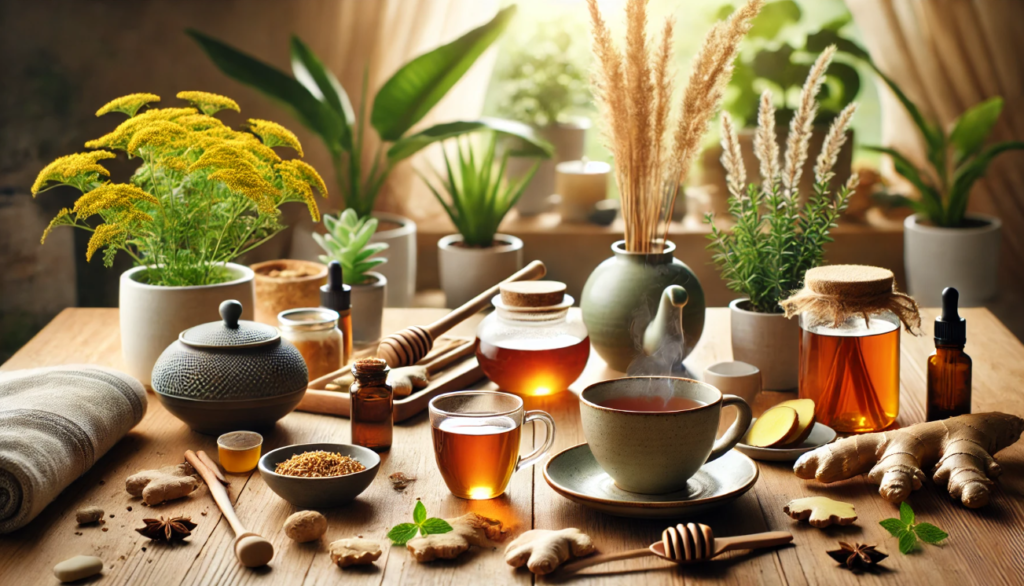In our fast-paced world, we often resort to over-the-counter medications to tackle common health issues. However, many everyday ailments can be addressed with natural remedies that not only promote wellness but also have fewer side effects compared to pharmaceutical drugs. From headaches to digestive discomfort, natural remedies are a powerful, effective, and safe way to alleviate symptoms. In this blog, we will explore natural remedies for common everyday ailments and how you can incorporate them into your daily routine.
1. Headaches and Migraines
Headaches are a common affliction that can disrupt your day. While painkillers provide temporary relief, natural remedies can help ease tension and reduce the frequency of headaches.
Natural Remedies for Headaches:
- Peppermint Oil: Known for its cooling and soothing properties, peppermint oil can help relieve tension headaches. Simply apply diluted peppermint oil to the temples and massage gently.
- Lavender Oil: Inhaling lavender essential oil has been shown to reduce headache symptoms. Add a few drops to a diffuser or inhale directly from the bottle.
- Ginger Tea: Ginger is a powerful anti-inflammatory and has been used to treat migraines. Brew some ginger tea by boiling fresh ginger slices in water for 10 minutes.
- Hydration: Dehydration is a common cause of headaches. Drinking plenty of water throughout the day can prevent headaches from occurring.
Table: Natural Remedies for Headaches
| Remedy | How it Works | Application |
|---|---|---|
| Peppermint Oil | Relieves tension and improves circulation. | Apply to temples and massage. |
| Lavender Oil | Reduces stress and soothes headaches. | Inhale from bottle or use in a diffuser. |
| Ginger Tea | Reduces inflammation and nausea. | Drink freshly brewed ginger tea. |
| Hydration | Dehydration is a common headache trigger. | Drink 8-10 glasses of water daily. |
2. Digestive Issues (Bloating, Gas, and Constipation)
Digestive discomfort such as bloating, gas, and constipation can cause significant distress. Luckily, several natural remedies can help soothe your digestive system and promote better gut health.
Natural Remedies for Digestive Issues:
- Peppermint Tea: Peppermint is known for its ability to relax the muscles of the digestive tract, which can help relieve bloating and gas. Drinking peppermint tea after meals can aid digestion.
- Ginger: As a carminative herb, ginger helps to relieve gas and bloating. It can also stimulate gastric juices and improve overall digestion. Drinking ginger tea or chewing on a small piece of fresh ginger can work wonders.
- Apple Cider Vinegar: The acidity of apple cider vinegar helps balance stomach acid levels, making it an effective remedy for indigestion. A tablespoon of apple cider vinegar mixed with water before meals can help reduce bloating.
- Probiotics: Probiotics are beneficial bacteria that support gut health and can help relieve constipation and gas. You can find probiotics in yogurt, kefir, or supplements.
Table: Natural Remedies for Digestive Issues
| Remedy | How it Works | Application |
|---|---|---|
| Peppermint Tea | Relieves bloating and gas by relaxing muscles. | Drink after meals. |
| Ginger | Stimulates digestion and relieves gas. | Drink ginger tea or chew fresh ginger. |
| Apple Cider Vinegar | Balances stomach acidity and aids digestion. | Mix with water and drink before meals. |
| Probiotics | Supports gut health and relieves constipation. | Eat yogurt or take probiotic supplements. |
3. Cold and Cough
A common cold or cough can be a nuisance, but nature offers several remedies to help boost your immune system and alleviate symptoms.
Natural Remedies for Cold and Cough:
- Honey and Lemon: Honey has antibacterial properties, while lemon is rich in vitamin C. A warm drink of honey and lemon in water can soothe a sore throat and help clear mucus.
- Echinacea: Echinacea is an herb commonly used to boost the immune system. Research shows that it can reduce the duration and severity of cold symptoms.
- Garlic: Garlic contains allicin, which has antimicrobial properties. Consuming raw garlic can help fight off colds and boost your immunity.
- Steam Inhalation: Steam inhalation with essential oils like eucalyptus can clear nasal congestion. Simply add a few drops of eucalyptus oil to a bowl of hot water, cover your head with a towel, and inhale the steam.
Table: Natural Remedies for Cold and Cough
| Remedy | How it Works | Application |
|---|---|---|
| Honey and Lemon | Soothes throat and clears mucus. | Drink a warm mixture of honey and lemon. |
| Echinacea | Boosts the immune system and reduces cold duration. | Take echinacea tea or supplements. |
| Garlic | Contains allicin, which has antimicrobial properties. | Eat raw garlic or use in cooking. |
| Steam Inhalation | Clears nasal congestion and soothes breathing. | Inhale steam with eucalyptus oil. |
4. Skin Irritations (Acne, Eczema, and Dry Skin)
Skin irritations like acne, eczema, and dry skin can be frustrating, but natural remedies can help keep your skin healthy and hydrated.
Natural Remedies for Skin Irritations:
- Aloe Vera: Aloe vera is well-known for its soothing and healing properties. It can help reduce inflammation and redness caused by acne and eczema. Simply apply fresh aloe vera gel to the affected area.
- Tea Tree Oil: Tea tree oil has antimicrobial properties that can help treat acne. Apply diluted tea tree oil to the acne-prone areas.
- Coconut Oil: Coconut oil is rich in fatty acids and can help hydrate dry skin. It also has antimicrobial properties, making it a good remedy for eczema and other skin conditions.
- Oatmeal Baths: Oatmeal is known to soothe irritated skin. An oatmeal bath can help calm eczema flare-ups and relieve itching.
Table: Natural Remedies for Skin Irritations
| Remedy | How it Works | Application |
|---|---|---|
| Aloe Vera | Reduces inflammation and soothes skin. | Apply fresh aloe vera gel directly to the skin. |
| Tea Tree Oil | Fights acne-causing bacteria. | Apply diluted tea tree oil to acne spots. |
| Coconut Oil | Hydrates and soothes dry skin. | Apply to dry or eczema-affected skin. |
| Oatmeal Baths | Relieves itching and soothes irritated skin. | Soak in an oatmeal bath. |
5. Stress and Anxiety
In today’s stressful world, anxiety and stress are common issues that many people face. While professional help is often necessary, natural remedies can provide relief and relaxation.
Natural Remedies for Stress and Anxiety:
- Lavender Oil: Lavender is widely recognized for its calming effects. Diffusing lavender oil or adding a few drops to your pillow at night can promote better sleep and reduce anxiety.
- Ashwagandha: Ashwagandha is an adaptogen that helps the body cope with stress. Taking ashwagandha supplements can help regulate cortisol levels and reduce stress.
- Chamomile Tea: Chamomile has mild sedative properties that can help calm the nervous system. Drinking chamomile tea before bed can improve sleep quality and reduce anxiety.
- Deep Breathing Exercises: Practicing deep breathing exercises can activate the body’s parasympathetic nervous system, which helps reduce stress and anxiety.

Table: Natural Remedies for Stress and Anxiety
| Remedy | How it Works | Application |
|---|---|---|
| Lavender Oil | Promotes relaxation and reduces anxiety. | Diffuse in the room or apply to pillow. |
| Ashwagandha | Reduces stress by regulating cortisol levels. | Take supplements as directed. |
| Chamomile Tea | Calms the nervous system and promotes sleep. | Drink before bed. |
| Deep Breathing | Activates the parasympathetic nervous system. | Practice daily breathing exercises. |
Important FAQs about Natural Remedies
Q1: Are natural remedies safe for everyone? A1: While natural remedies are generally safe, it’s essential to consider individual allergies or sensitivities. Always consult with a healthcare provider if you’re unsure about using a particular remedy.
Q2: How long does it take for natural remedies to work? A2: The effectiveness of natural remedies depends on the ailment and the remedy being used. Some remedies may show immediate effects, while others may take a few days to provide noticeable relief.
Q3: Can natural remedies replace prescribed medications? A3: Natural remedies can be a helpful supplement, but they should not replace prescribed medications. Always consult with a healthcare provider before making any changes to your medication regimen.
Q4: How can I incorporate these remedies into my daily routine? A4: You can incorporate natural remedies into your daily routine by drinking herbal teas, using essential oils, or adding remedies like ginger and turmeric to your meals. Consistency is key for the best results.
For more tips on living a healthier life, you can check out the blog at HealthyVibeHub.
This blog highlights some of the most effective natural remedies for everyday ailments that can improve your health and well-being. By integrating these remedies into your routine, you can reduce reliance on synthetic drugs and take a more holistic approach to managing your health.


